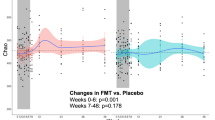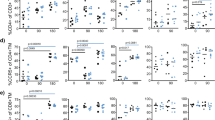Abstract
Objective: Dietary counseling and intervention based on application of conventional criteria have been ineffective in preventing the progressive weight loss associated with HIV infection. The aim of the study was to compare the progression of clinical and nutritional indicators during nutritional supplementation with or without an enterotropic peptide-based formula enriched with n-3 fatty acids.
Design: Randomized trial.
Setting: Tertiary care.
Subjects: Ninety-one patients were screened for the study. Twenty-three did not meet the inclusion criteria, therefore 74 patients were randomized. Of these, 38 were randomized to group I (standard formula) and 36 were randomized to group II supplementation (enterotropic peptide-based formula enriched with n-3 fatty acids).
Interventions: Group I received standard enteral formula and group II received a enterotropic peptide-based enteral formula. The volume was the same (3 cans/day, 236 ml per can). In both groups enteral supplementation were recommended in conjunction with a registered dietitian under a dietary counseling program based on standard nutrition principles. Patients received a prospective serial assessment of nutrition status, nutritional intake with 24 h written food records, GI symptoms, immune function, anthropometric status and intercurrent health events including infections and hospitalization. These determinations were performed at baseline and at 3 months.
Results: Treatment with both supplements resulted in a significant and sustained increase in weight (3.2% in group I and 3.1% in group II); this increase was mostly due to fat mass (12.8% in group I) and (7.5% in group II). Total body water and fat free-mass remained unchanged. CD4 counts remained stable in group I, while a significant increase was detected in group II (576±403 vs 642±394 cells/mm3; P<0.05). After the 3 month period CD4 counts remained higher in group II. Hospitalization events (infections) were also followed during the 3 month period. Group II had fewer hospitalizations than group I, but no statistical differences were found.
Conclusions: Oral nutritional supplements for a 3 month period were well tolerated and resulted in body weight gain in HIV-infected patients. Supplement-enriched formula, with peptides and n-3 fatty acids, increased CD4 count.
European Journal of Clinical Nutrition (2001) 55, 1048–1052
This is a preview of subscription content, access via your institution
Access options
Subscribe to this journal
Receive 12 print issues and online access
$259.00 per year
only $21.58 per issue
Buy this article
- Purchase on Springer Link
- Instant access to full article PDF
Prices may be subject to local taxes which are calculated during checkout
Similar content being viewed by others
References
Alvarez J, Planas M, Martin T, Hernandez C, Sanz J, Chacon P, Bellido D, Moreno F & Arancil FJ (2000) Supplementation in HIV patients in the highly active antiretoviral therapy Clin. Nutr. 19 (A40), 1 0
Centers for Disease Control and Prevention (1992) Revised classification system for HIV infection and expanded surveillance case definition for AIDS among adolescents and adults M.M.W.R. 41 (RR-17), 1–19
Chlebowski RT, Grosvenor M & Tai V (1991) Dietary fat intake, serum lipids and immunologic status in patients with HIV infection Am. J. Clin. Nutr. 53 1 5
Chlebowski RT, Beall G, Grosvenor M, Lillington L, Weintraub N, Ambler C & Richards E (1993) Long term effects of early nutritional support with new enterotropic peptide based formula vs standard enteral formula in HIV-infected patients: randomized prospective trial Nutrition 9 507–512
Clark RH, Feleke GF, Din M, Yasmin T, Singh G, Khan FA & Rathmacher JA (2000) Nutritional treatment for acquired immunodeficiency virus associated wasting using B-hydroxy B methylbutyrate, glutamine, and arginine: a randomized, double blind, placebo controlled study J. Parent. Enter. Nutr. 24 133–139
Endres S, Ghorbani R & Keley VE (1989) The effect of dietary supplementation with n-3 polyunsaturated fatty acids on the synthesis of interleukin-1 and TNf alpha by mononuclear cells New Engl. J. Med. 320 265–268
Greene JB (1988) Clinical approach to weight loss in the patient with HIV infection Gastroenterol. Clin. N. Am. 17 573–586
Guenter PA, Muurahainen N, Cohan GR, Turner JL & Mullen JL (1992) Relationship between nutritional status, CD4 counts ad survival in HIV infection Am. J. Clin. Nutr. 56 762–765
Guenter P, Muurahein N, Simons G, Kosos KA, Cohan Gr, Rudenstein R & Turner JL (1993) Relationship between nutritional status, disease progression, and survival in HIV infection J. Acquir. Immune Defic. Syndr. 6 1130–1138
Kambwa MS, Fleming SC, Griffin GE, Caun K, Pinching AJ & Harris JRW (1990) Fat absorption and exocrine pancreatic function in HIV infection Q. J. Med. 273 49–56
Kotler DP (1989) Malnutrition in HIV infection and AIDS AIDS 3 175–180
Kotler DP, Tierney AR, Wang J & Pierson RN (1989) Magnitude of body-cell-mass depletion and timing of death from wasting in AIDS Am. J. Clin. Nutr. 50 444–447
Macallan DC, Noble C, Baldwin C, Foskett M, McManus T & Griffin GE (1993) Prospective analysis of patterns of weight change in stage IV HIV infection Am. J. Clin. Nutr. 58 417–421
Macallan DC, McNurlan MA, Mime E, Calder AG & Gralick PJ (1995) Whole-body protein turnover from leucine kinetics and the response to nutrition in HIV infection Am. J. Clin. Nutr. 61 818–826
Melchior JC, Raguin G & Boulier A (1993) Resting energy expenditure in human immunodeficiency virus-infected patients: comparison between patients with and without secondary infections Am. J. Clin. Nutr. 57 614–619
Pichard C, Slosman D, Hirschel B & Kyle U (1993) Bioimpedance analysis in AIDS patients: an improved method for nutritional follow up Clin. Res. 41 53 a
Pichard C, Sudre P, Karsegard V, Yerly S, Slosman D, Delley V, Perrin L & Hirschel B (1998) A randomized double-blind controlled study of 6 months of oral nutritional supplementation with arginine and omega 3 fatty acids in HIV-infected patients AIDS 12 53–63
Shabert J & Wilmore DW (1996) Glutamine deficiency as a cause of human immunodeficiency virus wasting Med. Hypoth. 46 252–255
Shabert JK, Winslow C, Lacey J & Wilmore DW (1999) Glutamine-antioxidant supplementation increases body cell mass in AIDS patients with weight loss: a randomized, double blind controlled trial Nutrition 15 860–864
Süttmann U, Ockenga J & Schneider H (1996) Weight gain and increased concentrations of receptor proteins for tumor necrosis factor after patients with symptomatic HIV infection received fortified nutrition support J. Am. Diet. Assoc. 96 565–569
Teng MN, Park BH & Koeppen HKW (1991) Long term inhibition of tumor growth by TNF in the abscence of cachexia of Tcell immunity Proc. Natl. Acad. Sci. USA 88 3535–3548
Author information
Authors and Affiliations
Corresponding author
Rights and permissions
About this article
Cite this article
de Luis Román, D., Bachiller, P., Izaola, O. et al. Nutritional treatment for acquired immunodeficiency virus infection using an enterotropic peptide-based formula enriched with n-3 fatty acids: a randomized prospective trial. Eur J Clin Nutr 55, 1048–1052 (2001). https://doi.org/10.1038/sj.ejcn.1601276
Received:
Revised:
Accepted:
Published:
Issue Date:
DOI: https://doi.org/10.1038/sj.ejcn.1601276
Keywords
This article is cited by
-
Nutritional Aspects of People Living with HIV (PLHIV) Amidst COVID-19 Pandemic: an Insight
Current Pharmacology Reports (2022)
-
Impact of nutritional supplementation on immune response, body mass index and bioelectrical impedance in HIV-positive patients starting antiretroviral therapy
Nutrition Journal (2013)
-
Increased body weight and improved quality of life in AIDS patients following V-1 Immunitor administration
European Journal of Clinical Nutrition (2004)



